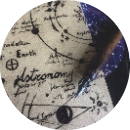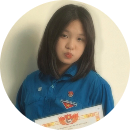Đề kiểm tra học kì 1
Các câu hỏi tương tự
One of the reasons for Edward to study a foreign language is that he______.
A. has just graduated from a high school. C. has just decided to enter a university
C. wants to impress people with his knowledge D. needs certain credits to graduate
1. Do you like to travel by public transportation? Why ?
2. Writing a letter to your friend, telling him about your childhood
3. Tell us about your dearest friend.
4. What do Vietnamese people using do during Tet festival ?
5. Your bicycle was stolen yesterday. Write to your parents, asking them to buy you another one.
6. Tell us about your mother.
7. Do you think education is important? Why?
8. Why do you think English is so popular?
9. Talk about the advantages of learning a foreign la...
Đọc tiếp
1. Do you like to travel by public transportation? Why ?
2. Writing a letter to your friend, telling him about your childhood
3. Tell us about your dearest friend.
4. What do Vietnamese people using do during Tet festival ?
5. Your bicycle was stolen yesterday. Write to your parents, asking them to buy you another one.
6. Tell us about your mother.
7. Do you think education is important? Why?
8. Why do you think English is so popular?
9. Talk about the advantages of learning a foreign language.
10. Talk about the film you like best.
* Đề 2:
1. Tell us about your dearest friend.
2. Tell us about your mother.
3. Tell us about your summer’s vacation.
4. What do Vietnamese people using do during Tet festival?
5. Talk about the advantages of learning a foreign language.
6. The advantages and disadvantages of being a member of a large family.
7. Is it necessary for children to go to school or they can study at home with a tutor.
8. Do you think education is important? Why?
9. Why do you think English is so popular? And how will you use English in the future?
10. What do you want to study when you go to university? Why 1. Do you like to travel by public transportation? Why ?
II. Pick out the word whose stress is placed differently from the others in each group. Identify your answer by writing the corresponding letter A, B, C or D on your answer sheet.
1. A. collect B. advise C. practise D. prepare
2. A. Improvement B. resident C. department D. environment
3. A. university B. documental C. historic D. electricity
4. A. graduation B. agricultural...
Đọc tiếp
II. Pick out the word whose stress is placed differently from the others in each group. Identify your answer by writing the corresponding letter A, B, C or D on your answer sheet.
1. A. collect B. advise C. practise D. prepare
2. A. Improvement B. resident C. department D. environment
3. A. university B. documental C. historic D. electricity
4. A. graduation B. agricultural C. industrial D. recommend
5. A. intelligent B. difficult C. interesting D. hospital
B. LEXICAL - GRAMMAR
I. Choose from the four options given (marked A, B, C and D) one best answer to complete each sentence. Identify your answer by writing the corresponding letter A, B, C or D on your answer sheet.
1. Faraday attended a lecture ___________ by a famous scientist.
A. giving B. gave C. given D. to give
2. We couldn’t help___________ when he told us what had happened.
A. laugh B. to laugh C. to be laughing D. laughing
3. “___________ bad weather we are having this summer!” said the woman.
A. What a B. How C. What D. How this
4. I understand most of this, _________ there are still one or two points I would like you to clear up for me.
A. however B. but C. therefore D. so
5. Could you buy me a copy of the newspaper___________ your way to work?
A. for B. by C. along D. on
6. The car was easy to recognize so it wasn’t ___________ difficult for the police to catch the thieves.
A. much B. many C. too D. such
7. I was so tired that I ___________ asleep in the chair.
A. got B. went C. felt D. fell
8. This is Mr. White ___________ invention has helped hundreds of disabled people.
A. who B. which C. that D. whose
9. I need some help with the table. ___________ you lift the other end, please?
A. May B. Should C. Could D. Shall
10. She used to___________ her living by delivering vegetables to local hotels.
A. earn B. to earn C. earning D. earns
II. Each sentence below has four underlined words or phrases marked A, B, C, D. Circle one underlined word or phrase that must be changed in order for the sentence to be correct. Identify your answer by writing the corresponding letter A, B, C or D on your answer sheet.
1. People think computers never do any mistakes, but in fact, they do.
A B C D
2. Going to the cinema is an enjoyable way relaxing at weekend.
A B C D
3. Since Mai looks a bit pale these days, I think she should have taken up some exercises.
A B C D
4. He appears being a perfect man but in fact, he is very rude to his wife.
A B C D
5. The youth nowadays prefer pop music than traditional music.
A B C D
III. Supply the correct form of the words in brackets. Write your answer on your answer sheet.
1. She had never been greatly concerned about her ___________ (APPEAR)
2. The _____________ of people interviewed prefer TV to radio. (MAJOR)
3. I'm afraid I was very___________ with the travel arrangements. (satisfy)
4. Even the most ___________ person ought to appreciate the beauty of this music. (sense)
5. If she can make up such stories, she is certainly a very ___________girl. (imagine)
C. READING
I. Read the following passage then choose the best answer from the four options (marked A, B, C and D) to complete the numbered blanksin the passage. Identify your answers by writing the corresponding letter A, B, C or D on your answer sheet.
Christmas is a Christian holiday. It commemorates the __________ (1) of Jesus Christ more than 2,000 years ago. Christian churches hold ___________(2) services to celebrate Christmas ______(3) midnight on Christmas ____________(4), most churches hold special candlelight services. But Christmas is also a social and family____________(5). It is a festival of goodwill, a
time____________ (6) family, friends, food, and gift-giving. Many Americans share Christmas cookies, decorate their home, and place presents ____________(7) the family Christmas tree. Children often hang up stockings for Santa Claus to fill _________(8) small gifts. __________ (9) tradition, Santa comes on a sleigh pulled by reindeer. Presents are ____________(10) opened on Christmas Eve or Christmas Day.
1. A. day B. birth C. God D. father
2. A. Religious B. religion C. region D. regional
3. A. On B. in C. under D. at
4. A. Morning B. afternoon C. evening D. Eve
5. A. Christmas B. holiday C. weekend D. day
6. A. Of B. to C. for D. on
7. A. on B. under C. beside D. in
8. A. With B. in C. of D. on
9. A. Despite B. Because of C. According to D. But
10. A. Never B. rarely C. sometimes D. usually
Computer programmer David Jones earns £35,000 a year by designing new computer games, yet he cannot find a bank prepared to let him have a cheque card. Instead, he has been told to wait another two years, until he is 18. The 16-year-old works for a small firm in Liverpool, where the problem of most young people of his age is finding a job. Davids firm releases two new games for the expanding home computer market each month. But Davids biggest headache is what to do with his money.In spite of his...
Đọc tiếp
Computer programmer David Jones earns £35,000 a year by designing new computer games, yet he cannot find a bank prepared to let him have a cheque card. Instead, he has been told to wait another two years, until he is 18. The 16-year-old works for a small firm in Liverpool, where the problem of most young people of his age is finding a job. David's firm releases two new games for the expanding home computer market each month. But David's biggest headache is what to do with his money.
In spite of his salary, earned by inventing new programs within tight schedules, with bonus payments and profit-sharing, he cannot drive a car, take out a mortgage, or obtain credit cards. He lives with his parents in their council house in Liverpool, where his father is a bus driver. His company has to pay £150 a month in taxi fares to get him the five miles to work and back every day because David cannot drive. David got his job with the Liverpool-based company four months ago, a year after leaving school with six O-levels and working for a time in a computer shop. "I got the job because the people who run the firm knew I had already written some programs." he said. "I suppose £35,000 sounds a lot but actually that's being pessimistic. I hope it will come to more than that this year”. He spends some of his money on records and clothes, and gives his mother £20 a week. But most his spare time is spent working.
"Unfortunately, computing was not part of our studies at school," he said. "But I had been studying it in books and magazines for four years in my spare time. I knew what I wanted to do and never considered staying on at school”. Most people in this business are fairly young, anyway. David added: "I would like to earn a million and I suppose early retirement is a possibility. You never know when the market might disappear."
Question 1. How does David earn money?
A. by working as a taxi driver
B. by selling new programs
C. by designing new computer games
D. by running a small firm
Question 2. Why is David different from other young people at his age?
A. He earns an extremely high salary.
B. He is not unemployed.
C. He does not go out much.
D. He lives at home with his parents.
Question 3. David's greatest problem is_________.
A. making the banks treat him as an adult
B. inventing computer games
C. spending his salary
D. learning to drive
Question 4. He was employed by the company because__________
A. he had worked in a computer shop.
B. he had written some computer programs.
C. he works very hard.
D. he had learnt to use computers at school.
Question 5. He left school after taking O-levels because_____________
A. he did not enjoy school.
B. he wanted to work with computers and staying at school did not help him.
C. he was afraid of getting too old to start computing.
D. he wanted to earn a lot of money.
Question 6. Why does David think he might retire early?
A. You have to be young to write computer programs.
B. He wants to stop working when he is a millionaire.
C. He thinks computer games might not always sell so well.
D. He thinks his firm might go bankrupt.
Question 7. The word "it" in paragraph 2 refers to_________________________
A. computing
B. producing
C. teaching
D. introducing
Mark the letter A, B, C, or D on your answer sheet to indicate the sentence that is closest in meaning to each of the following questions.Question 11: Nga had just arrived home and there was a knock at the door.A. Not only did Nga just arrive home but there was also a knock at the door.B. No sooner had Nga just arrived home when there was a knock at the door.C. Had it been for Ngas arrival home, there wouldnt have been a knock at the door.D. Scarcely had Nga arrived home when there was a knock a...
Đọc tiếp
Mark the letter A, B, C, or D on your answer sheet to indicate the sentence that is closest in meaning to each of the following questions.
Question 11: Nga had just arrived home and there was a knock at the door.
A. Not only did Nga just arrive home but there was also a knock at the door.
B. No sooner had Nga just arrived home when there was a knock at the door.
C. Had it been for Nga's arrival home, there wouldn't have been a knock at the door.
D. Scarcely had Nga arrived home when there was a knock at the door.
Question 12: Chris said that it was Rosa who had left the door unlocked.
A. Rosa was accused of having left the door unlocked.
B. Chris offered that Rosa was the one having left the door unlocked.
C. Chris blamed Rosa for leaving the door unlocked.
D. Chris warned Rosa about having left the door unlocked.
Question 13: The anandamide found in chocolate breaks down more quickly than the anandamide found in the brain.
A. The anandamide found in chocolate breaks down the quickest compared to the anandamide found in the brain.
B. The anandamide found in chocolate breaks down a lot quicker than the anandamide found in the brain.
C. The more quickly the anandamide found in chocolate breaks down, the more slowly the anandamide found in the brain.
D. The anandamide found in chocolate breaks down the most quickly among all the anandamides found in the brain.
Which of the following has nothing to do with his final decision to continue his study of Japanese?
A. The university requires students to study that language.
B. The university thinks that a foreign language makes the students more educated.
C. Edward studied Japanese by himself and used it when he traveled in Tokyo.
D. He hopes that some day he may work for a company in Japan.
Choose the best answer to complete the following sentences: 1. Did you see that great prize? I hope you bought your raffle ticket because you’ve got to be in it to ____ it! A. win B. get C. have D. make 2. It was difficult question, but I really feel like a hit ______ run with it. A. house B. home c. nest d. land 3. Eventually her effort ______ fruit and she got the job she wanted. A. produced B. created C. bore D. made
Write a letter (50 - 75 words) to a local official about an environmental problem in your country.
● What is the problem?
● Who or what does the problem affect?
● Who or what is causing it?
● What’s the solution to the problem?
Viết theo kiểu basic thôi nha.
i didn't known his address so i didn't write to him
A. if i knew his address, i would write to him
B. if i known his address, i will write to him
C. if i had known his address, i would have written to him
D. unless i didn't known his address, i would write to him




















